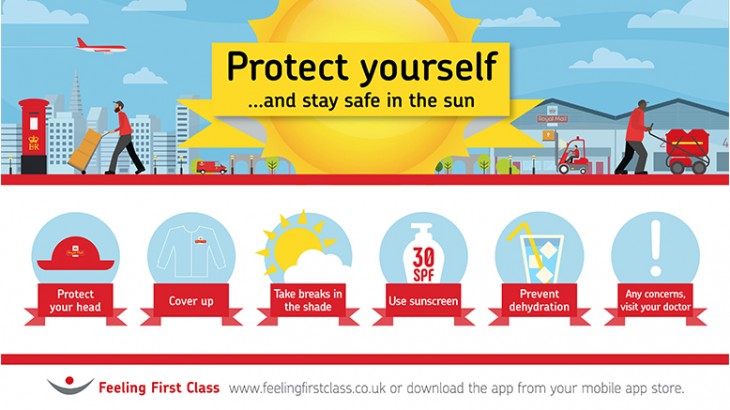Rays and shine

In warm weather, it’s important to remember the little things all of us can do to reduce our exposure to the sun.
Please follow these recommendations to help protect yourself from sunstroke and the risk of skin cancer, which is now the most common and fastest rising cancer in the UK.
- Cover up - Wear long, loose clothing to keep the sun off your skin. Your uniform is made from a special fabric to protect against ultraviolet radiation.
- Protect your head - Don't forget your head, face, ears and neck. Wear the hat that is part of your uniform - it's specially treated to protect against the sun. If you wish to wear personal sunglasses, please ensure they have ultraviolet (UV) protection.
- Take your break in the shade - Come out of the sun when you get the chance, especially during the most powerful UV periods of the day between 11.00–15.00.
- Use sunscreen - Use Sun Protection Factor (SPF) 30 or higher on any exposed skin - apply it half an hour before going outside, put plenty on and reapply it frequently.
- Be skin safe - Report mole changes (size, shape, colour, itching or bleeding) or any other concerns about your skin to your doctor. Non-melanoma skin cancers tend to develop most often on skin that is exposed to the sun from working outside. See your doctor if you have:
- A spot or sore that doesn't heal within four weeks
- A spot or sore that hurts, is itchy, crusty, scabs over, or bleeds for more than four weeks
- Areas where the skin has broken down (an ulcer) and doesn't heal within four weeks.
To avoid heat exhaustion and heatstroke, try to limit the time you spend in the sun and be sure to drink plenty of fluids to avoid dehydration.
Summer can be a difficult time for people who suffer with seasonal allergic rhinitis, commonly known as hay fever.
Hay fever is caused by exposure to grass, tree or plant pollen, which is released into the air. In the UK, pollen exposure is most common between late March and September, especially when it's warm, humid and windy. This is when the pollen count is at its highest. Here are some top tips to help limit your exposure to airborne pollen:
- Be prepared and monitor the pollen count
- Put Vaseline around your nostrils to trap pollen
- Wear wraparound sunglasses to stop pollen getting into your eyes
- Shower and change your clothes after you have been outside to wash pollen off
- Keep windows and doors shut as much as possible.
A pharmacist can help with hay fever. They can give advice and suggest the best treatments, such as antihistamine drops, tablets or nasal sprays to help with itchy and watery eyes and sneezing; or a blocked nose.



